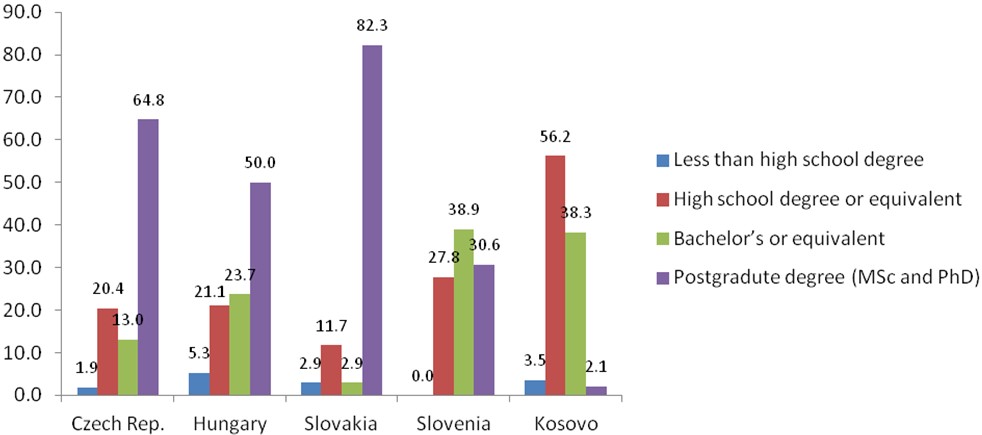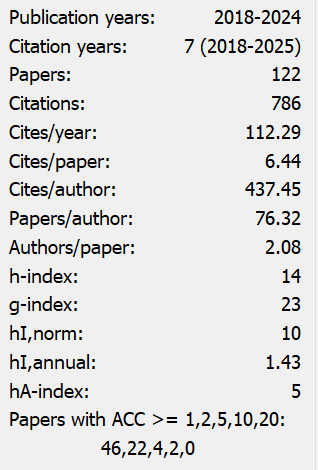Founders' Education and SME Performance in Kosovo
Abstract
This research deals with the professional preparation of the founders of the SME sector in Kosovo, and also aims to present the state of abilities and skills of the founders of SMEs. Also of interest in this research is the analysis of the skills of managers, founders of SMEs, what is their perception regarding the reflection of education in the SME business, namely what is their performance which should be reflected in the success and development of SMEs. The paper therefore aims to analyze the education and reflection of this education on the success of SMEs. Economic and social development in Kosovo, and elsewhere, depends on the success of SME owners and managers. This management structure will be able to move SMEs forward if they have an important factor such as education and experience in the sector where the SME operates. This paper explores the professional background of the founders, the size of the business structure, the experience of the founders in the field where the SME was founded, the age at the time of its establishment, the impact of technology.
References
Bleiklie, I. (2005). Organizing higher education in a knowledge society. Higher Education, 49(1-2), 31-59. https://doi.org/10.1007/s10734-004-2913-7
Carter, S., & D. Jones-Evans (Eds.) (2000). Enterprise and Small Business – Principles, Practice and Policy. Harlow: FT Prentice Hall. https://doi.org/10.1108/00251740810882707
Carter, S., & Jones-Evans, D. (Eds.). (2006). Enterprise and small business: Principles, practice and policy. Pearson Education.
Durowoju, S. T. (2017). Impact of Technological Change On Small and Medium Enterprises Performance in Lagos State. Economic and Environmental Studies, 17(44), 743-756. https://doi.org/10.25167/ees.2017.44.7
Gary S. Becker (1992). The Economic Way of Looking At Life* Nobel Lecture, December 9, 1992 G ARY S. Becke R Department of Economics, University of Chicago, Chicago, IL. 60637, USA, p. 44.
Giuseppe, F., & Giorgio, V. (2009). Human Capital Measurement: A Survey. Jurnal of Economic Surveys, 24(2), prill 20110, fq 248-279. https://doi.org/10.1111/j.1467-6419.2009.00614.x
Goldin, C., & Katz, L. F. (1999). Human capital and social capital: The rise of secondary schooling in America, 1910-1940. Journal of interdisciplinary history, 29(4), 683-723. https://doi.org/10.1162/002219599551868
Hashi, I., & Krasniqi, B. (2011). Entrepreneurship and SME growth: Evidence from advanced and laggard transition economies. International Journal of Entrepreneurial Behavior & Research, 17(5), 456-487. https://doi.org/10.1108/13552551111158817
Havolli, Y., & Ahmeti, S. (2013). Deindustrialization of Kosovo and establishment of the private sector in Kosovo-Obstacles. ILIRIA International Review, (1). https://doi.org/10.21113/iir.v3i1.95
Holden, L., & Biddle, J. (2017). The introduction of human capital theory into education policy in the United States. History of Political Economy, 49(4), 537-574. https://doi.org/10.1215/00182702-4296305
Kosovo Agency of Statistics. (2019). Statistical Repertoire of Economic Enterprises in Kosovo.
Krasniqi, B. (2006). Size, age and firm growth: Econometric evidence from SME sector in Kosova. International Journal of management and Entrepreneurship, 2(1), 57-68.
Krasniqi, B., & Lajqi, S. (2018). Gibrat’s law and Jovanovic’s learning theory: an empirical test for small firms in a postconflict economic setting. Ekonomski pregled, 69(3), 251-268. https://hrcak.srce.hr/202517
Havolli, Y. (2004). Human resource management, 2004, Riinvest.
Mamuneas, T. P., Savvides, A., & Stengos, T. (2006). Economic development and the return to human capital: A smooth coefficient semiparametric approach. Journal of Applied Econometrics, 21(1), 111-132. https://doi.org/10.1002/jae.813
OECD. (2004). 2nd OECD Conference of Minister responsible for Small and Medium-Sized Enterprises (SMEs) Promoting Entrepreneurship and Innovative SMEs in global economy: Towards a more responsible and inclusive globalisation Istanbul, Turkey 3-5 June 2004, p. 5. Oxford English Dictionary.
Petty, W. (1690). Political Arithmetik, or a Discourse Conceirning the Extent and Value of Lands, People, Buildings. Reprinted in C.H. Hull (1899). The Economic Writings of Sir William Petty. Cambridge: Cambridge University Press.
Riinvest Institute. (2007). Business Climate in Kosovo from a Business Perspective, Prishtine: Riinvest Institute
Schultz, T. W. (1960). Capital formation by education. Journal of Political Economy, 68(6), 571-583. https://doi.org/10.1086/258393
Voca, Z., & Havolli, Y. (2019). The Impact of Human Resources Development on Small and Medium Enterprises (SMEs) Performance. Journal of Economics and Management Sciences, 2(2), p45-p45. https://doi.org/10.30560/jems.v2n2p45
Williams, C. C., & Krasniqi, B. (2018). Explaining informal sector entrepreneurship in Kosovo: An institutionalist perspective. Journal of Developmental Entrepreneurship, 23(02). https://doi.org/10.1142/S1084946718500115
Williams, N., & Krasniqi, B. A. (2018). Coming out of conflict: How migrant entrepreneurs utilise human and social capital. Journal of International Entrepreneurship, 16(2), 301-323. https://doi.org/10.1007/s10843-017-0221-4.
Woldie, A., Leighton, P., & Adesua, A. (2008). Factors influencing small and medium enterprises (SMEs): An exploratory study of owner/manager and firm characteristics.


This work is licensed under a Creative Commons Attribution 4.0 International License.
Copyright for this article is retained by the author(s), with first publication rights granted to the journal.
This is an open-access article distributed under the terms and conditions of the Creative Commons Attribution license (http://creativecommons.org/licenses/by/4.0/).


























